Archive
14 January 2022
TU Delft anniversary dedicated to energy transition
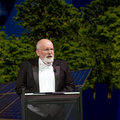
On Friday 14 January, TU Delft celebrated its 180th Dies Natalis, or birthday. The university has chosen ‘speeding up the energy transition’ as theme for the anniversary celebrations, which will continue over 180 days after Friday’s official Dies Natalis ceremony.
13 January 2022
SpaceX launches TU Delft mini-satellite: will it survive in space?
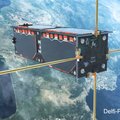
During the Transporter-3 satellite launch by SpaceX on 13 January from Cape Canaveral a small satellite from Delft will also travel into space. The DelfiPQ is one of the smallest satellites in the world.
11 January 2022
ERC Starting Grant for four TU Delft researchers
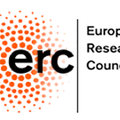
The European Research Council (ERC) has announced the ERC Starting Grants for young researchers. Four of them are scientists from TU Delft. This European grant of €1.5 million for a five-year programme is intended to enable individual scientists to build their own teams and conduct groundbreaking research.
10 January 2022
TU Delft builds decarbonised energy system for the built environment
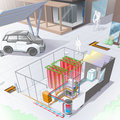
The energy transition will be felt most keenly in residential areas, where there are major challenges. . At The Green Village – the field lab for sustainable innovation on the TU Delft Campus – a unique project to accelerate the energy transition in the built environment will start on Friday 14 January: the 24/7 Energy Lab.
07 January 2022
Dies Natalis TU Delft

On 8 January, 2022, TU Delft celebrates its 180th anniversary. We will mark this on 14 January during our Dies Natalis ceremony, when we will also kick-off of our anniversary year. From that day on, everyone can participate in a 180-day anniversary programme devoted to the energy transition.
21 December 2021
Impact study shows North/South metro line to be the ‘backbone’ of Amsterdam’s public transport network

The four-year study conducted by TU Delft, AMS Institute and others into the transport-related, spatial and economic effects of the North/South metro line is now complete and was recently presented to Amsterdam’s regional and City councils.
16 December 2021
Veni grants for seven leading TU Delft researchers
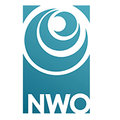
The Dutch Research Council (NWO) has awarded 89 highly promising young scientists from the ENW and ZonMw domain a Veni grant worth up to 280,000 euros. The grant provides the laureates with the opportunity to further elaborate their own ideas during a period of three years.
13 December 2021
Ronald Hanson wins Physica Prize 2022

The Physica Prize 2022 has been awarded to Ronald Hanson, distinguished professor in quantum computing and quantum internet at TU Delft and group leader at QuTech. According to the Nederlandse Natuurkundige Vereniging, he deserves the prize for several reasons.
12 December 2021
The landslide forecast coming to you from space
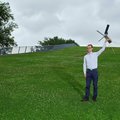
Catching the breeze may bring you gold but sail too close to the wind and you’ll miss the boat. Combined with a sailor’s intuition meteorologist Sukanta Basu’s highly detailed wind forecast may well help the Dutch sailing team secure a win at the Olympics this year.
09 December 2021
Irene Dedoussi new member of the Young Academy 2022

The Young Academy is welcoming ten new members. They are researchers who work in a variety of disciplines, have been selected for their scientific achievements, and received their doctorates less than ten years ago. One of them is Dr. Irene Dedoussi, Associate Professor in the field of climate impact of aviation.
07 December 2021
Collaborating with China: in search of balance

“Partnering with China has pros and cons – it is not a black and white situation”, said Tim van der Hagen, President of the Executive Board of TU Delft at the recently held symposium on 9 November. “There are risks, and people worry about knowledge protection, about dual use. It is important that together and in dialogue with external parties and experts, we help our researchers find the right balance for their specific joint project. A symposium like this one and the China Tools living document our university developed earlier this year are a real, concrete help in navigating the waters of academic collaboration with China”.
02 December 2021
Climate adaptation of households compared internationally
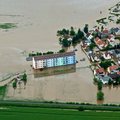
The climate is changing, not only in the Netherlands, but far beyond as well. The UN climate conference in Glasgow in 2021 had a clear message: climate adaptation is required of everyone; from governments to individuals around the world. Researchers from Delft University of Technology and Twente University investigated the drivers of what motivates or hinders people in different cultures in climate adaptation. The results were published in the scientific journal Nature Climate Change.
30 November 2021
The formation of kidney stones on a microscale
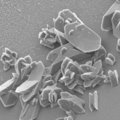
Researchers from TU Delft developed a method to watch the formation of kidney stones on a microscale, in a so called microfluidic platform. By slightly adjusting the pH and the concentration of specific minerals, the formation could be slowed down or inhibited completely. The research is now published in Biomicrofluidics.
24 November 2021
TU Delft creates one of the world’s most precise microchip sensors – thanks to a spiderweb

A team of researchers from TU Delft managed to design one of the world’s most precise microchip sensors; the device can function at room temperature – a ‘holy grail’ for quantum technologies and sensing.
23 November 2021
Universities of the Netherlands present Lifelong Learning Platform

On 23 November, a new national course catalogue for lifelong learning www.universitairdoorleren.nl was launched. This joint project of all VSNU (Association of Universities) member institutions is led by Delft University of Technology and the Open University, and aims to provide a comprehensive overview of all post-graduate education on offer in the Netherlands for adults and professionals wishing to continue their education.
22 November 2021
New platform opens quantum networking to everyone

Starting today, everyone can freely access Quantum Network Explorer (QNE) to experiment with quantum networks. QNE is developed by QuTech—a collaboration between Delft University of Technology and TNO—and specifically aimed at researchers, students, software developers and future users of quantum network applications.
19 November 2021
Delft scientists put the spotlight on combined capture and conversion of CO2
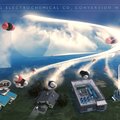
CO2 can be electrochemically converted into valuable chemicals and fuels. Both capturing and converting CO2 do, however, require a lot of energy. An optimal combination of both processes can save a lot of energy and reduce the loss of materials. The TU Delft research group of David Vermaas recently published a paper in Nature Catalyses, summarising the various ideas on how to achieve this.
18 November 2021
The Best Tech Idea of 2021: processor and memory in one
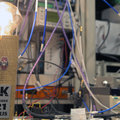
Said Hamdioui's 'computation-in-memory' is the Best Tech Idea of 2021 according to the jury of KIJK magazine. The jury praised Said's computer architecture for making numerous new innovations possible: "the Internet of Things requires large amounts of computers that all must be very energy-efficient. Memristors can be the basis for this and that makes this idea, however young, very important."
17 November 2021
Delft Design alumnus Jerry de Vos wins James Dyson Award sustainability prize
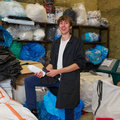
With his Plastic Scanner, Jerry de Vos has designed a handheld device that can tell you quickly what kind of plastic something is made of. Knowing this is crucial for better reuse and recycling of the growing worldwide plastic waste.
11 November 2021
Zhuo-ming Shia: TU Delft Best Graduate
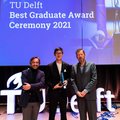
Today, at the online TU Delft Best Graduate Award Ceremony 2021, eight recently graduated engineers presented their research and results of their excellent master thesis. Zhuo-ming Shia, graduate of the Faculty of Architecture and the Built Environment received the prestigious title TU Delft Best Graduate 2021.
11 November 2021
The North Sea is ready for its close-up
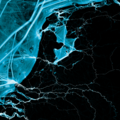
09 November 2021
Looking between the hidden layers of The Night Watch
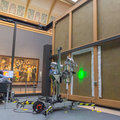
TU Delft researchers Andrei Anisimov, Roger Groves and Nan Tao used their special research equipment in the Rijksmuseum last week, to make the invisible structure of The Night Watch visible.
08 November 2021
Rain Showers grow in size and intensity

05 November 2021
TU Delft Education Heroes in the spotlight during Education Day on 4 November

04 November 2021
Scanning a single protein, one amino acid at a time
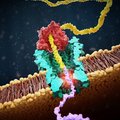
Using nanopore DNA sequencing technology, researchers from TU Delft and the University of Illinois have managed to scan a single protein: by slowly moving a linearized protein through a tiny nanopore, one amino acid at the time, the researchers were able to read off electric currents that relate to the information content of the protein. The researchers published their proof-of-concept in Science today. The new single-molecule peptide reader marks a breakthrough in protein identification, and opens the way towards single-molecule protein sequencing and cataloguing the proteins inside a single cell.
04 November 2021
QuTech creates a time crystal
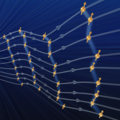
Researchers from QuTech created a time crystal, a novel exotic quantum phase of matter, using a quantum computer based on diamond. Together with a simultaneous experiment by Google, the results shed new light on the physics of out-of-equilibrium quantum systems. The team reports their findings today in Science.
02 November 2021
Marileen Dogterom gekozen tot KNAW-president
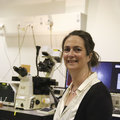
02 November 2021
Using dredged mud to strengthen our dikes
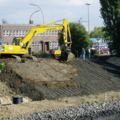
28 October 2021
TU Delft on the 50e place in THE Reputation Ranking
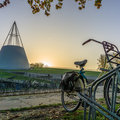
TU Delft takes 50th position on the 2021 Times Higher Education World Reputation Ranking published today. As far as European universities are concerned, TU Delft has ended in 13th position, and within the Netherlands TU Delft is number one.
28 October 2021
TU Delft participates in National Climate Week
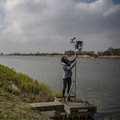
From 28 October to 5 November, it is National Climate Week with the slogan 'everyone does something'. TU Delft, as a climate university, is fully participating, because attention to the climate is more urgent than ever.
26 October 2021
Brunel Solar Team on third place after intensive first day in Marocco
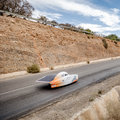
22 October 2021
Mechanism underlying the emergence of virus variants unravelled
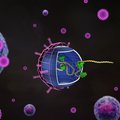
An international consortium, led by Delft University of Technology and the University of North Carolina, has for the first time succeeded in probing the molecular origins of recombination in RNA viruses. Hiccups during the copying process of viruses cause recombination to take place: the exchange of segments of viral RNA.
15 October 2021
TU Delft on board the world largest crane vessel for exploring future Offshore Wind Turbines
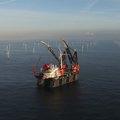
How do you install a wind turbine far out at sea when high waves and strong winds make its installation virtually impossible? With this question in mind, a team of researchers from TU Delft, in collaboration with Heerema Marine Contractors (HMC) and DOT B.V., boarded the world's largest crane vessel this week: Heerema's Sleipnir. As part of a major pioneering project, the FOX project, they are exploring floating wind turbine installation.
08 October 2021
TU Delft, Deltares and ProRail to tackle rail subsidence in a structural way
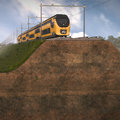
ProRail, TU Delft and Deltares will conduct an investigation over the next five years into the behaviour of trains travelling along our railway embankments. On 4 October 2021, they signed the RESET research programme agreement for this purpose. This research will focus on the consequences of increased and heavier rail traffic along with climate change on our railway embankments and how we can anticipate them. As there is little fundamental systematic knowledge in this field in Europe, this pioneering research may also assist other countries facing similar problems.
07 October 2021
New method helps identifying murder suspects more quickly

Delft PhD student Daan Sutmuller has developed a new, effective method in collaboration with the police that supports homicide investigation teams in collecting and prioritising interesting persons in the investigation more quickly. The promising method should make the investigation work more manageable and ensure that more homicide cases are solved. Sutmuller obtains his doctorate this Thursday with his dissertation 'Murder investigation in the digital age'.
01 October 2021
Diversity & Inclusion Week 4-8 oktober 2021

24 September 2021
TU Delft set to future-proof electricity grid
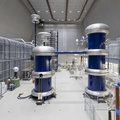
In order to ensure that the electricity grid is prepared for the future, TU Delft, the Dutch government and partners including grid operator TenneT have joined forces to build a brand-new laboratory: the Electrical Sustainable Power Lab, otherwise known as the ESP Lab. The laboratory – described as a ‘veritable temple of sustainability’ – will be officially opened on the afternoon of Friday, 1 October 2021.
22 September 2021
Understanding human-robot interaction critical in design of rehabilitation systems
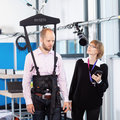
Robotic body-weight support (BWS) devices can play a key role in helping people with neurological disorders to improve their walking. The team that developed the advanced body-weight support device RYSEN in 2018 has since gained more fundamental insight in BWS but also concludes that improvement in this field is necessary.
22 September 2021
Now everyone can build battery-free electronic devices

Last year, computer engineers from Delft University of Technology (TU Delft) and Northwestern University introduced the world’s first battery-free Game Boy, which harvests both solar energy and the user’s kinetic energy from button mashing to power an unlimited lifetime of game play. The same team now introduces a new platform that enables makers, hobbyists and novice programmers to build their own battery-free electronic devices that run with intermittent, harvested energy.
21 September 2021
TU Delft opens Climate Action Hub on Campus The Hague
